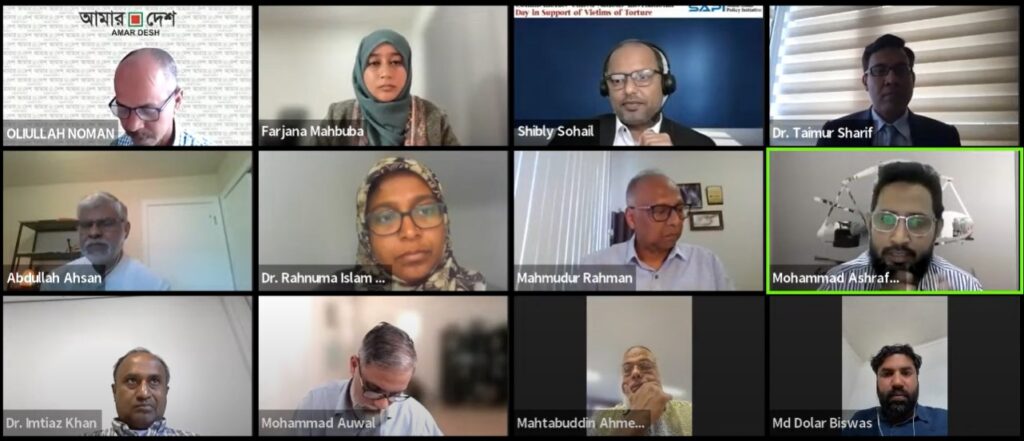Webinar to Commemorate United Nations' International Day in Support of Victims of Torture

Location: Virtual
Date: 26th June 2023
Description
On June 26, 2023, the South Asian Policy Initiative (SAPI) organised a webinar to mark the United Nations’ International Day in Support of Victims of Torture. This significant day was established by the UN General Assembly through Resolution 52/149 on December 12, 1997, recognising torture as a crime against humanity.
The webinar featured a keynote speech titled “Standing up for the victims of torture” by Mohammad Ashrafuzzaman, a prominent human rights defender and Program Coordinator at the Asian Legal Resources Centre. Dr. Mahmudur Rahman, a renowned Bangladeshi Editor in exile, presided over the event. The panel of discussants included academics and researchers from Bangladesh, the USA, UK, Australia, Canada, and Kurdistan, with Shibly Sohail, the Secretary of SAPI, serving as the moderator.
During the keynote speech, Ashrafuzzaman highlighted how torture directly threatens democracy and equal opportunities, hindering citizens’ participation in socio-economic, political, and cultural aspects of life. The discussion revolved around the impact of torture on individuals and communities, as well as short-term and long-term strategies for supporting torture victims. Ashrafuzzaman also addressed the legal situation regarding torture in South Asian countries, particularly India, Bangladesh, Pakistan, and Sri Lanka. However, the focus of the discussion later shifted to Bangladesh due to its dire human rights situation and the prevalent culture of state-sponsored torture.
Dr. Mahmudur Rahman, President of SAPI and Editor of Amar Desh, expressed gratitude to all participants and discussed the case of Abrar Fahad, a university student who was tortured and killed by members of the Bangladesh Chhatra League, the student wing of the ruling government party. Dr. Rahman emphasised the importance of rebuilding institutions and holding perpetrators accountable for their actions. He mentioned that the society in Bangladesh remained silent for a long time in fear of a nationwide torture culture administered by a regime run by a murderous tribe-like family.
Professor Abdullah al-Ahsan, a renowned professor of Comparative Civilization, highlighted the longstanding culture of torture in Bangladesh, dating back to the fifties, sixties and seventies. He discussed incidents such as the killing of a Deputy Speaker of the Provincial Parliament and attacks on political activists by members of the Awami League, the current ruling party. Professor al-Ahsan suggested that educating people about universal human dignity and fostering transparency were crucial strategies for overcoming and eradicating the culture of torture.
Professor Mohammad A. Auwal from California State University stated that Bangladesh had become a republic of fear due to the widespread practice of torture over the past decade. He emphasised the responsibility of conscious individuals to raise awareness within the international community. Professor Taimur Sharif from the University of Kurdistan Hewlêr emphasised the need for more research to document the current situation and propose potential solutions, acknowledging the challenges posed by government oppression in conducting such research. Dr. Imtiaz Khan from Cardiff Metropolitan University in the UK discussed the role of technology in providing authenticated evidence when documenting incidents of torture.
During the panel discussion, Dr. Aliar Hossain from Northumbria University London, Dr. Rahnuma Islam Nishat from Ryerson University in Canada, Dr. Farjana Mahbuba from the Australian Catholic University, and Dr. Md Azabul Haque from the UK explored various aspects of torture and its impacts, particularly on women and children. They highlighted the dominant and widespread culture of torture in Bangladeshi university hostels, which inevitably affects society as a whole. The participants also mentioned instances of online torture threats and bullying by pro-government individuals during the so-called Shahbag movements in Bangladesh.
In addition to Bangladeshi academics from various countries, members of the SAPI Executive Committee and associated Research Fellows also participated in the webinar. The discussion concluded with a unanimous consensus on the need to eradicate the culture of torture in order to restore human rights in Bangladesh.

